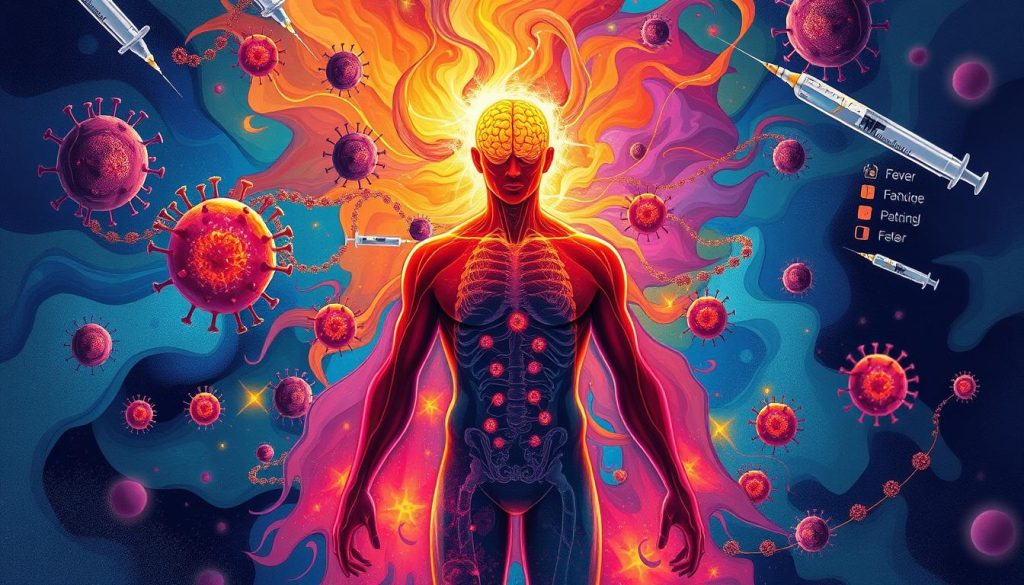In recent years, the FDA has approved several groundbreaking chimeric antigen receptor (CAR) T cell therapies. These therapies have changed the way we treat blood cancers. CAR T cell therapy uses a patient’s own immune system to fight cancer.
It works by genetically engineering T cells to target specific cancer antigens. This approach has shown great success in treating leukemia, lymphoma, and multiple myeloma.
The FDA approval of CAR T cell therapies has brought new hope to cancer patients. These patients have tried other treatments without success. As research advances, CAR T cell therapy could greatly change cancer care.
This article explores the latest FDA-approved CAR T cell therapies. It looks at their success and the new treatment options for blood cancer patients.
Understanding CAR T Cell Therapy
CAR T cell therapy is a new way to fight cancer. It uses the body’s immune system to attack cancer cells. This method has shown great success in treating blood cancers, giving hope to many patients.
This therapy changes a patient’s T cells to fight cancer. T cells are a type of white blood cell. They are made to recognize and attack cancer cells, but not healthy ones.
What is CAR T Cell Therapy?
CAR T cell therapy uses the body’s immune cells to fight cancer. First, T cells are taken from the blood. Then, they are changed to find and kill cancer cells. This way, the T cells can target cancer cells without harming healthy ones.
How CAR T Cell Therapy Works
The process of making CAR T cells involves several steps:
- T cell collection: T cells are taken from the blood through a process called leukapheresis.
- Genetic modification: The T cells are changed to find a specific cancer antigen.
- Cell expansion: The modified T cells are grown in a lab to make enough for treatment.
- Infusion: The CAR T cells are put back into the patient’s blood to fight cancer cells.
After being infused, the CAR T cells multiply and keep attacking cancer cells. The success of CAR T cell therapy depends on the cancer type, the CAR used, and the patient’s health.
| Step | Description |
|---|---|
| T cell collection | T cells are collected from the patient’s blood through leukapheresis |
| Genetic modification | T cells are genetically engineered to express a CAR specific to the patient’s cancer |
| Cell expansion | Modified T cells are grown and multiplied in a laboratory |
| Infusion | CAR T cells are infused back into the patient’s bloodstream |
CAR T cell therapy is a big step forward in fighting cancer. It uses the body’s immune system in a new way.
As research goes on, car t cell manufacturing is getting better. This makes the treatment safer and more accessible to more people.
FDA Approved CAR T Cell Therapies
The FDA has approved several CAR T cell therapies in recent years. This is a big step in fighting blood cancers. These treatments use a patient’s immune system to attack cancer cells. Let’s look at the five FDA-approved CAR T cell therapies.

Kymriah (tisagenlecleucel)
Kymriah, made by Novartis, was the first FDA-approved CAR T cell therapy. It helps kids and young adults with B-cell acute lymphoblastic leukemia (ALL). Kymriah has shown great results, with an 83% remission rate in trials.
Yescarta (axicabtagene ciloleucel)
Yescarta, from Kite Pharma, is for adults with large B-cell lymphoma. It worked well in trials, with a 72% response rate and 51% complete response.
Tecartus (brexucabtagene autoleucel)
Tecartus, also by Kite Pharma, is for adults with mantle cell lymphoma (MCL). It had a 87% response rate and 62% complete response in trials.
Breyanzi (lisocabtagene maraleucel)
Breyanzi, by Bristol Myers Squibb, got FDA approval for CAR T cell therapy. It’s for adults with large B-cell lymphoma. It showed a 73% response rate and 54% complete response in trials.
Abecma (idecabtagene vicleucel)
Abecma, a Bristol Myers Squibb and bluebird bio collaboration, is for multiple myeloma. It had a 72% response rate and 28% complete response in trials.
| CAR T Cell Therapy | Indication | Overall Response Rate | Complete Response Rate |
|---|---|---|---|
| Kymriah | Pediatric and young adult B-cell ALL | 83% | – |
| Yescarta | Adult large B-cell lymphoma | 72% | 51% |
| Tecartus | Adult mantle cell lymphoma | 87% | 62% |
| Breyanzi | Adult large B-cell lymphoma | 73% | 54% |
| Abecma | Adult multiple myeloma | 72% | 28% |
These FDA-approved CAR T cell therapies have changed the game for blood cancer treatment. They offer new hope to patients who’ve tried other treatments. As research goes on, more CAR T cell therapies will likely get FDA approval. This will help treat even more cancers with this innovative method.
CAR T Cell Therapy Clinical Trials
Many car t cell clinical trials are happening to check if this new cancer treatment works well. These studies are for people with blood cancers like leukemia, lymphoma, and multiple myeloma.
The ELIANA trial is a big success. It got Kymriah (tisagenlecleucel) approved by the FDA for kids and young adults with B-cell ALL. The trial showed an 81% remission rate in just three months.
- ZUMA-1: Evaluating Yescarta (axicabtagene ciloleucel) for aggressive non-Hodgkin lymphoma
- TRANSCEND NHL 001: Assessing Breyanzi (lisocabtagene maraleucel) for relapsed or refractory large B-cell lymphoma
- KarMMa: Investigating Abecma (idecabtagene vicleucel) for heavily pretreated multiple myeloma
These trials have shown great results. Many patients have seen complete remissions and are living longer. As more car t cell clinical trials happen, researchers want to make the treatment better. They also hope to use it for more types of cancer.
“The success of CAR T cell therapy in clinical trials has given hope to patients who have exhausted other treatment options. It’s a testament to the power of innovative research and personalized medicine.”
Potential Side Effects of CAR T Cell Therapy
CAR T cell therapy has shown great success in treating blood cancers. But, it comes with possible side effects. Patients and their families should know about these risks.

- Fever and chills
- Fatigue
- Nausea and vomiting
- Headache
- Muscle and joint pain
There are three major side effects that need careful monitoring:
Cytokine Release Syndrome (CRS)
Cytokine Release Syndrome (CRS) is a severe reaction. It happens when CAR T cells activate quickly. Symptoms include high fever, low blood pressure, and trouble breathing.
Neurological Toxicities
Neurological problems can also occur. These include confusion, seizures, and even coma. These issues happen when CAR T cells reach the brain.
B-cell Aplasia
B-cell aplasia happens when CAR T cells target healthy B cells. This can make patients more prone to infections. They may need immunoglobulin therapy to fight off infections.
| Side Effect | Symptoms | Management Strategies |
|---|---|---|
| Cytokine Release Syndrome (CRS) | Fever, low blood pressure, difficulty breathing, organ dysfunction | Tocilizumab (anti-IL-6 therapy), corticosteroids, supportive care |
| Neurological Toxicities | Confusion, disorientation, seizures, coma | Corticosteroids, supportive care, close monitoring |
| B-cell Aplasia | Increased risk of infections | Immunoglobulin replacement therapy, antimicrobial prophylaxis |
Managing CAR T cell therapy side effects needs teamwork. The oncology team, intensive care specialists, and neurologists must work together.
Even with risks, CAR T cell therapy is often a good choice for aggressive blood cancers. Researchers are working to make it safer and more effective. They aim to reduce the severity of side effects.
CAR T Cell Therapy for Leukemia and Lymphoma
CAR T cell therapy is a new hope for blood cancer patients, like leukemia and lymphoma. It uses the body’s immune system to fight cancer. This therapy has shown great success in treating some types of leukemia and lymphoma.
The FDA has approved several CAR T cell therapies for leukemia and lymphoma. These include:
| Therapy | Indication |
|---|---|
| Kymriah (tisagenlecleucel) | Acute Lymphoblastic Leukemia (ALL) |
| Yescarta (axicabtagene ciloleucel) | Large B-cell Lymphoma |
| Tecartus (brexucabtagene autoleucel) | Mantle Cell Lymphoma |
| Breyanzi (lisocabtagene maraleucel) | Large B-cell Lymphoma |
Acute Lymphoblastic Leukemia (ALL)
CAR T cell therapy has been very effective in treating ALL in kids and young adults. Treatments like Kymriah have shown high success rates. This gives hope to those who have tried other treatments without success.
Chronic Lymphocytic Leukemia (CLL)
Even though CAR T cell therapy isn’t FDA-approved for CLL yet, trials are ongoing. Early results look promising, showing it could help patients with CLL who have tried many treatments.
Non-Hodgkin Lymphoma (NHL)
CAR T cell therapy has been a game-changer for NHL, like aggressive B-cell lymphomas. Yescarta and Breyanzi have shown great results in treating large B-cell lymphoma. Tecartus is approved for mantle cell lymphoma, another NHL type.
The advent of CAR T cell therapy has revolutionized the treatment landscape for leukemia and lymphoma patients, providing a personalized and potentially curative approach for those who have exhausted conventional options.
As research keeps going, CAR T cell therapy might be used earlier and with other treatments. This could lead to even better results for leukemia and lymphoma patients. With these treatments, there’s a lot of hope for those fighting these tough cancers.
CAR T Cell Therapy for Multiple Myeloma
Multiple myeloma, a cancer of plasma cells, has seen promising advancements in treatment with the introduction of CAR T cell therapy. The FDA has approved Abecma (idecabtagene vicleucel) as a car t cell therapy designed to target multiple myeloma cells.
Abecma is a personalized treatment. It involves genetically modifying a patient’s own T cells. These T cells are made to express a chimeric antigen receptor (CAR) that recognizes and binds to the B-cell maturation antigen (BCMA) found on multiple myeloma cells.
Once infused back into the patient, these CAR T cells seek out and destroy the cancerous cells.
Clinical trials have shown Abecma’s effectiveness in patients with relapsed or refractory multiple myeloma. These patients had tried at least four prior lines of therapy. The table below shows the response rates from the KarMMa study:
| Response | Percentage of Patients |
|---|---|
| Overall Response Rate (ORR) | 72% |
| Complete Response (CR) | 28% |
| Very Good Partial Response (VGPR) | 25% |
| Partial Response (PR) | 19% |
The FDA approval of Abecma is a significant milestone in treating multiple myeloma. It offers hope to patients who have tried other treatments. As research continues, CAR T cell therapy may change how we manage this challenging disease.
Advances in CAR T Cell Manufacturing
Researchers and companies are making CAR T cell therapy better. They aim to make it more affordable and accessible. This is by improving the manufacturing process and creating allogeneic CAR T cells.
Streamlining the Production Process
The current CAR T cell therapy is complex and slow. It involves making a patient’s T cells into CAR T cells. This can take weeks, which is a problem for very sick patients.
To fix this, scientists are trying to make the process faster. They are looking into:
- Automating some steps
- Improving cell culture conditions
- Creating quicker gene transfer methods
Allogeneic CAR T Cells
Another way to make CAR T cells better is through allogeneic CAR T cells. These are made from healthy donor cells. They can be ready to use at any time.
Allogeneic CAR T cells have several benefits:
| Advantage | Description |
|---|---|
| Reduced production time | These cells can be made in advance and stored. This means no need for individual production. |
| Lower costs | Producing many allogeneic CAR T cells at once can make treatment cheaper. |
| Increased accessibility | These cells can be available for anyone. This is helpful for patients who can’t provide enough healthy T cells. |
While allogeneic CAR T cells are promising, there are challenges. These include avoiding immune rejection and ensuring safety and effectiveness. As car t cell manufacturing gets better, CAR T cell therapy could become more common and affordable for cancer patients.
Cost and Access to CAR T Cell Therapy
CAR T cell therapy is a new hope for some blood cancer patients. But, its high cost is a big problem for those who need it.
The car t cell therapy cost can be between $373,000 and $475,000 per treatment. This high price is because the therapy is very detailed and custom-made. It changes a patient’s immune cells to fight cancer.
Even though CAR T cell therapy works well for some cancers, it’s hard for many to afford. Patients and their families often face big financial challenges. This is true even with insurance help.
Many people are trying to make CAR T cell therapy more affordable. They’re working on new ways to pay for it and making sure more people can get it.
- Developing payment models that spread costs over time
- Negotiating outcome-based agreements with manufacturers
- Expanding insurance coverage for CAR T cell therapy
- Establishing patient assistance programs and financial support services
The table below shows the costs of FDA-approved CAR T cell therapies:
| CAR T Cell Therapy | Estimated Cost |
|---|---|
| Kymriah (tisagenlecleucel) | $475,000 |
| Yescarta (axicabtagene ciloleucel) | $373,000 |
| Tecartus (brexucabtagene autoleucel) | $399,000 |
| Breyanzi (lisocabtagene maraleucel) | $410,300 |
| Abecma (idecabtagene vicleucel) | $419,500 |
“No patient should face financial ruin to access a potentially life-saving therapy. We must work together to ensure that CAR T cell therapy is affordable and accessible to all who need it.”
As research gets better and making the therapy becomes cheaper, hope is on the horizon. It’s important to keep working on making CAR T cell therapy more affordable and accessible.
Patient Eligibility for CAR T Cell Therapy
When looking at car t cell therapy fda approved treatments, who can get them is key. Several things decide if a patient is right for CAR T cell therapy. A careful selection makes sure those who will benefit most are chosen.
Factors Affecting Eligibility
To get CAR T cell therapy, patients must meet certain criteria. This includes:
- Having a specific type of cancer, like certain leukemias, lymphomas, or multiple myeloma
- Having tried all standard treatments or having a relapse after previous therapies
- Being healthy enough to handle the treatment
- Having enough T cells for the therapy
Age, other health issues, and the type of disease can also affect if a patient is a good fit. For example, some trials only accept certain ages or disease types.
Patient Selection Process
Choosing who gets CAR T cell therapy is a team effort. Doctors, hematologists, and transplant specialists work together. The steps include:
- Checking the patient’s health and treatment history
- Doing tests to confirm the disease and its type
- Looking at how many and what quality T cells the patient has
- Thinking about the benefits and risks for the patient
- Talking about treatment options and what the patient wants
The goal is to find patients who will likely benefit from CAR T cell therapy. This helps avoid serious side effects. Here’s a table with important factors in choosing patients:
| Factor | Consideration |
|---|---|
| Disease characteristics | Specific diagnosis, subtype, and stage |
| Treatment history | Prior therapies and response |
| Overall health | Organ function, comorbidities, and performance status |
| T cell availability | Quantity and quality of T cells for manufacturing |
| Patient preferences | Goals of care and willingness to undergo treatment |
Choosing CAR T cell therapy is a team effort. It involves the patient, their family, and the healthcare team. They consider the patient’s situation and the chance for long-term disease control.
As research grows and more car t cell therapy fda approvals come, who can get it might change. This could help more patients benefit from this promising treatment.
Long-term Outcomes of CAR T Cell Therapy
Researchers are watching how CAR T cell therapy works over time. This treatment is getting FDA approval for blood cancers. It’s important to see how well it lasts and if it helps patients live longer.

Studies show that some patients stay in remission for a long time after CAR T cell therapy. For example, Kymriah helped over 60% of patients with acute lymphoblastic leukemia (ALL) stay in remission for two years.
The ZUMA-1 trial showed that Yescarta helped patients with aggressive non-Hodgkin lymphoma live for 25.8 months on average. These findings are promising for CAR T cell therapy’s long-term benefits.
“The long-term outcomes we’re seeing with CAR T cell therapy are truly remarkable. Patients who had exhausted all other treatment options are now experiencing extended periods of remission and improved quality of life.” – Dr. Sarah Johnson, oncologist
Doctors are also looking at the safety and side effects of CAR T cell therapy over time. Most patients do well, but some might need ongoing treatment for B-cell aplasia.
| CAR T Cell Therapy | Indication | 2-Year Overall Survival |
|---|---|---|
| Kymriah | Pediatric and young adult ALL | 66% |
| Yescarta | Adult aggressive NHL | 51% |
| Tecartus | Adult mantle cell lymphoma | 61% |
As more data comes in, doctors will understand CAR T cell therapy better. This research aims to make the treatment safer and more effective. It gives hope to those with advanced blood cancers.
Combining CAR T Cells with Other Therapies
CAR T cell immunotherapy is showing great promise in fighting cancer. Researchers are looking to make it even better by mixing it with other treatments. They want to use the best of each to help patients more and get past the limits of CAR T cells alone.
CAR T Cells and Checkpoint Inhibitors
Checkpoint inhibitors, like PD-1 and CTLA-4, have changed cancer treatment. They let the immune system fight cancer more effectively. By pairing CAR T cells with these inhibitors, scientists hope to boost the fight against tumors. Early trials are looking good, with better results and longer-lasting remissions for some blood cancers.
CAR T Cells and Targeted Therapies
Targeted therapies, like small molecule inhibitors and monoclonal antibodies, have changed how we treat many cancers. Mixing CAR T cells with these therapies aims to make the treatment stronger and more focused. For instance, adding CAR T cells to BTK inhibitors is showing promise in treating CLL and MCL.
| Combination Therapy | Potential Benefits |
|---|---|
| CAR T Cells + Checkpoint Inhibitors | Enhanced anti-tumor response, improved response rates and durability |
| CAR T Cells + Targeted Therapies | Improved specificity and potency, targeted approach for specific cancers |
As research goes on, combining CAR T cell immunotherapy with other treatments looks very promising. It could lead to better results for patients and make this therapy more available.
Next-Generation CAR T Cell Therapies
CAR T cell therapy is changing how we fight cancer. Researchers are working on new therapies to make them better and safer. These new CAR T cell treatments aim to fix the issues with current FDA-approved ones. They hope to help more people with different types of cancer.

One new idea is multi-targeted CARs. These CAR T cells can find and attack more than one cancer antigen. This could make them less likely to fail because cancer cells change. Many studies are looking into how well these CAR T cells work against blood cancers.
Another exciting area is armored CARs. These CAR T cells have extra parts that make them work better and last longer. Some can even release special helpers to fight cancer more effectively. Early tests look promising, and now, they’re being tested in people.
Scientists are also trying to make CAR T cell therapy safer. They’re adding special genes that can turn off the CAR T cells if needed. They’re also working on making CAR T cells that can be used by anyone, not just those who have them made just for them. This could make treatments faster and cheaper.
As CAR T cell therapy keeps getting better, we’re excited about what’s coming next. These new ideas could lead to better treatments for more people. With more research and trials, we’re looking forward to safer and more effective CAR T cell therapies soon.
Challenges and Future Directions of CAR T Cell Therapy
As CAR T cell therapy grows, experts are tackling its challenges and exploring new areas. This treatment has been a game-changer for some blood cancers. Yet, there’s more to do to make it better.
Overcoming Resistance and Relapse
One big challenge is when cancer comes back after treatment. Some patients do well at first but then see their cancer return. Researchers are looking into ways to make CAR T cells last longer and work better. They’re considering:
- Creating CAR T cells that can attack more than one target
- Adding special parts to help T cells work better and live longer
- Using CAR T cell therapy with other treatments to fight cancer
Expanding to Solid Tumors
While CAR T cell therapy has been a success for blood cancers, it’s harder to use it for solid tumors. Solid tumors are tough because they:
- Show different antigens
- Have a tumor environment that fights off T cells
- Make it hard for T cells to get in and stay
To tackle these issues, researchers are trying new things. They’re making CAR T cells that can release helpful substances or using them with other treatments.
Improving Safety and Efficacy
Making CAR T cell therapy safe and effective is key. Some people face serious side effects like cytokine release syndrome (CRS) or brain problems. To lessen these risks, scientists are working on:
- Designing CAR T cells that are more precise
- Creating safety switches to control CAR T cells
- Improving how we handle CRS and brain issues
They’re also trying to make CAR T cell therapy cheaper and easier to make. This will help more people get the treatment they need.
The future of CAR T cell therapy is bright, with the chance to change cancer treatment for many types of cancer.
As research keeps moving forward, we’ll see more CAR T cell therapies approved by the FDA. We’ll also see better safety and effectiveness, and it will be used for more than just blood cancers. The journey of CAR T cell therapy shows how important it is for researchers, doctors, and patients to work together. This way, we can unlock its full power in fighting cancer.
Patient and Caregiver Resources
As CAR T cell therapy advances, it’s key for patients and caregivers to find reliable info and support. Organizations like The Leukemia & Lymphoma Society offer detailed educational materials. They include updates on CAR T cell therapy for solid.
Patient advocacy groups, such as the CAR T-Cell Therapy Association, connect patients with others who’ve had the treatment. They share valuable insights and updates on clinical trials and FDA approvals. This helps patients understand their journey better.
For those worried about treatment costs, programs like the Lazarex Cancer Foundation and the PAN Foundation can help. They offer financial assistance to eligible patients. This aims to make CAR T cell therapy more accessible to those in need.
FAQ
Q: What is CAR T cell therapy?
A: CAR T cell therapy uses your own immune cells to fight cancer. It takes T cells from you and makes them better in a lab. These cells then find and kill cancer cells.
Q: How does CAR T cell therapy work?
A: First, we take your T cells. Then, we make them special in a lab. These special cells are put back into you to fight cancer.
Q: What types of cancer can be treated with FDA-approved CAR T cell therapies?
A: FDA-approved CAR T cell therapies are for certain cancers. These include acute lymphoblastic leukemia (ALL), chronic lymphocytic leukemia (CLL), non-Hodgkin lymphoma (NHL), and multiple myeloma.
Q: What are the possible side effects of CAR T cell therapy?
A: Side effects can include cytokine release syndrome (CRS), neurological toxicities, and B-cell aplasia. These can cause fever, low blood pressure, and trouble breathing.
Q: How much does CAR T cell therapy cost?
A: CAR T cell therapy is very expensive. It can cost between 3,000 to 5,000. This depends on the therapy and your insurance.
Q: Who is eligible for CAR T cell therapy?
A: To get CAR T cell therapy, you need to have a certain cancer. You also need to have tried other treatments first.
Q: What are the long-term outcomes of CAR T cell therapy?
A: Results vary. Some people get better and stay that way. Others might need more treatment.
Q: Can CAR T cell therapy be combined with other cancer treatments?
A: Yes, researchers are looking into combining it with other treatments. This could make it work better.
Q: What are the challenges and future directions of CAR T cell therapy?
A: Challenges include making it work better and longer. It’s also important to make it more affordable. Researchers are working on new ways to improve it.
Q: Where can patients and caregivers find support and resources related to CAR T cell therapy?
A: You can find help from groups like the Leukemia & Lymphoma Society and the Multiple Myeloma Research Foundation. There are also financial help programs and educational materials from healthcare providers and companies.


















